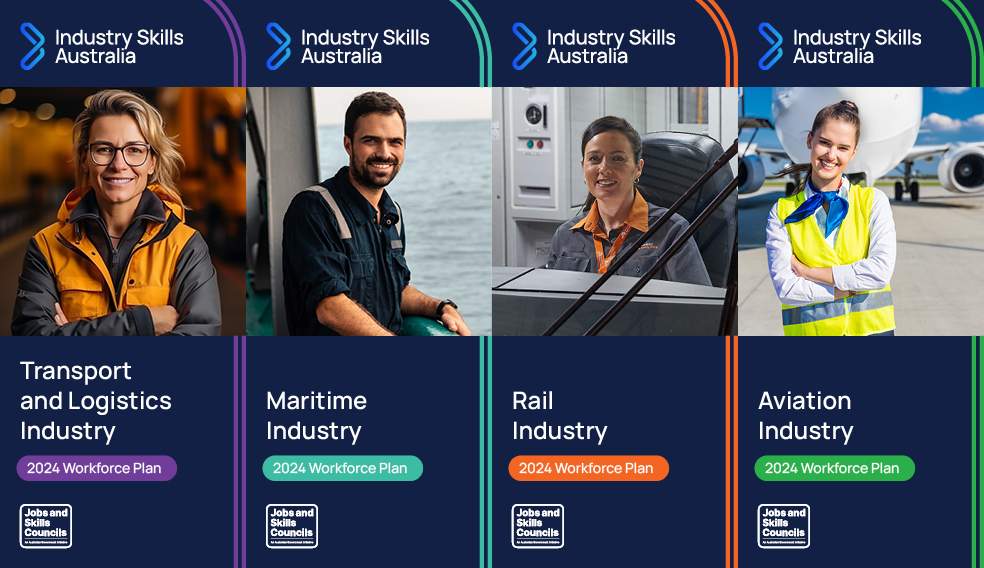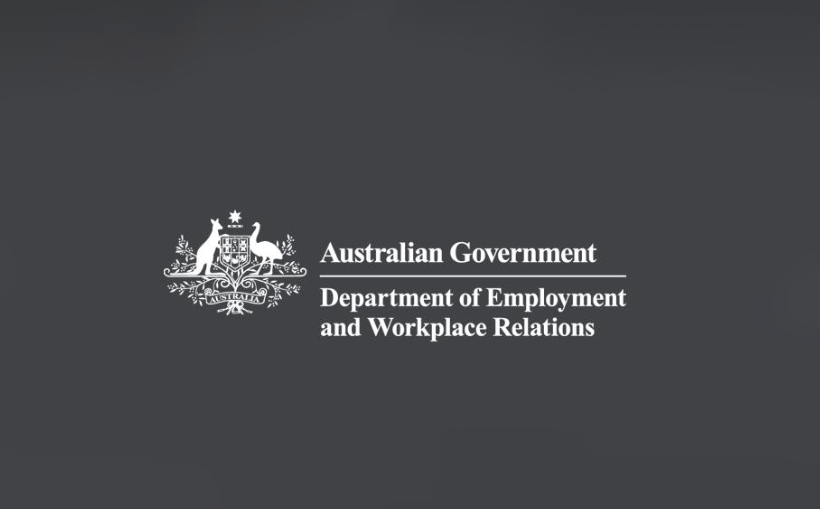Mar 22, 2024
Welcome to the March edition of our newsletter
In this month’s newsletter
- 2024 Workforce Plan Drafts now Available for Comment
- ISA Strategic Workforce Planning Committees Recap
- Project Updates
- VET Workforce Blueprint Submission Process and Survey
- Strategic Review of the Australian Apprenticeships Incentive System
- Charting Australia's Maritime Emissions Reductions
- New Jobs and Skills Australia Commissioner
- It’s Training Awards Season
2024 Workforce Plans Draft now Available for Comment
The 2024 Workforce Plan drafts are now available for your feedback.
Workforce Planning for each of our four key industries, Transport and Logistics, Rail, Aviation and Maritime, is central to our role as a Jobs and Skills Council. While data and research underpin the Plans, your insights and experience are critical to getting the information right. Bringing together your insights and our data and research builds a strong evidence base that will ensure the Workforce Plans are effective in addressing the issues that really matter, and delivering high-impact, meaningful solutions.
The Workforce Plans set out the industry's workforce development challenges and opportunities and serve as a roadmap for the future by identifying what the national skills system, governments, and industry itself, need to do to build an agile, highly productive and resilient workforce.
Together, we are shaping an innovative, inclusive, and forward-thinking future for your industry.
Explore the Draft Workforce Plans and submit your feedback.
ISA Strategic Workforce Planning Committees Recap
The annual Workforce Plans are the key output of our Strategic Workforce Planning Committees. Leaders from across each industry form the membership of each committee, making evidence-based decisions to identify the immediate and emerging skill needs of their industry sector.
The four industry Committees met in February to review and discuss the first draft of their 2024 national Workforce Plans. All were particularly concerned about current occupational and skills shortages in their industries. Other common concerns across all four industries were the workforce development implications of digital transformation and decarbonisation. Current skills system barriers such as shortages of trainers, training resources and facilities, the need for a range of new training package products to cover emerging needs, and funding arrangements all impact their ability to respond to the prevailing challenges.
The Aviation Committee focussed on critical shortages and the need to promote the industry, develop career pathways, and highlight available opportunities. Ongoing issues with attracting and retaining workers, especially in regional areas, were highlighted, and members stressed the need to promote diversity, and engage with all airlines and training providers. Aligning VET qualifications with CASA licensing, recognising Defence Flight Instructors' training by CASA, and enhancing industry recognition for cabin crew and ground operations qualifications, were also central to discussions.
Maritime Committee members discussed industry skills shortages and proposed actions to address them. The Committee highlighted impacts on key maritime projects and initiatives, including recommendations from the Strategic Fleet Taskforce, and the need to remain focused on all areas of the maritime industry.
The Rail Committee discussed the importance of retaining existing workers through upskilling, reskilling, and improved working conditions within the essential current focus on attracting new entrants, particularly from underrepresented groups. They also stressed the importance of the workforce plan responding to the challenges and opportunities that emerging technologies and decarbonisation initiatives are creating.
The Transport and Logistics Committee confirmed their key priorities include the importance of creating clear career pathway information to promote occupations in T&L, the need for heavy vehicle licensing reforms, and identified gaps in training for transport management roles, with additional focus required on how to remove barriers to employment in the T&L industry for under-represented cohorts.
Find out more about each of our Strategic Workforce Planning Committees and their work:
Project Updates
We recently commenced two new training product development projects for the aviation industry. There will be opportunities for all stakeholders to have a say throughout the life of the projects.
You can find out more about all of our projects here.
Technical Committees of subject matter experts are currently being formed for these projects. If you’d like to express your interest in participating, you can find more information on the project pages linked below.
AVIATION RESCUE PROJECT
The Certificate III in Aviation (Rescue Crew Officer) and Certificate IV in Aviation (Air Crew Officer) are being reviewed and updated to enable broader applicability across different sectors such as emergency services and defence.
The review will enable more aircrew and rescue crew officers to access nationally accredited training, whether they use rotary or fixed-wing aircraft to conduct search and rescue operations in different contexts. This is expected to enhance the qualifications' usability, leading to increasing enrolments and greater workforce mobility.
Find out more here.
AVIATION: TRANSPORT SECURITY PROTECTION PROJECT
This project will review and update the Certificate II in Transport Security Protection (TSP) to align it with regulatory changes, the latest technologies and current industry practices.
Screening officers in the aviation, maritime, and air cargo sectors are required to hold a Certificate II in TSP. The review will ensure that skill standards are in line with current workplace requirements in each sector. This will streamline and enhance the delivery of the qualification by training providers, leading to increased efficiency and lower delivery costs, especially for regional training providers.
Find out more here.
MARINE ORDER 505 PROJECT
Draft materials aligning training products with Maritime regulation Marine Order 505 have been developed by a Technical Committee of subject matter experts and Industry Skills Australia is currently seeking stakeholder feedback.
The draft materials include the following new Skill Set and Unit of Competency:
- Coxswains Grade 3 Skill Set
- Command and manage a voyage on a vessel up to 45 metres (Near coastal)
The project has also updated 18 qualifications, eight Skill Sets and 76 Units of Competency.
Find out more here.
TRANSPORT AND LOGISTICS: CHAIN OF RESPONSIBILITY PROJECT
Feedback has been received on draft updates of two Units of Competency pertaining to Chain of Responsibility, which have been aligned with National Heavy Vehicle Regulator (NHVR) requirements.
A Technical Committee of subject matter experts revised the units to incorporate principal obligations relating to Chain of Responsibility for specific job functions, and current industry terminology.
Find out more here.
VET Workforce Blueprint Submission Process and Survey
In collaboration with state and territory governments, the Australian Government is developing a VET Workforce Blueprint to support, grow and sustain the VET workforce.
The Blueprint will identify actions to address VET workforce issues, such as attraction, retention, development and career progression, and succession planning.
The consultation seeks views from stakeholders, including people who have recently left the VET workforce, through a survey and submission process.
Visit the Quality Reforms page for more information on how to provide your feedback.
Submissions close at AEDT 11 pm 26 March 2024.
Strategic Review of the Australian Apprenticeships Incentive System
The Australian Government has initiated a strategic review of the Australian Apprenticeships Incentive System in light of the critical skills shortages Australia faces, plus a massive drop in apprentices and trainee commencements, the most severe in recent decades.
The review will:
- Examine the complementary role of services, support and high-quality training provision.
- Address the need to build the necessary skills and talent in the workforce.
- Support businesses to meet their current and emerging skills needs, including future pathways that emerge with the net zero transformation.
- Consider the cost-of-living pressures and financial stresses that prevent apprentices from completing their training.
- Ensure engagement with underrepresented groups, such as women, First Nations people, and people with disabilities, to improve apprenticeship participation in priority occupations facing skills shortages.
The review will be informed by targeted research and underpinned by broad stakeholder consultation.
For more information:
- Strategic Review of the Australian Apprenticeships Incentive System
- Australian Apprenticeship Incentive System Guidelines
Charting Australia's Maritime Emissions Reductions
Shipping is vital to Australia's economy and well-being—transporting over 99% of our international trade volume. In 2021–22, the domestic maritime sector emitted around 2 million tonnes of greenhouse gas emissions, or 2.2% of Australia's transport emissions and 0.4% of total national emissions.
As part of developing a National Transport and Infrastructure Net Zero Roadmap and Action Plan, the Australian Government is working closely with the maritime industry to develop a Maritime Emissions Reduction National Action Plan (MERNAP) in 2023–24.
The MERNAP will set the strategic direction and recommend actions to decarbonise our maritime transport sector and contribute to reducing international shipping emissions. The plan will seek to identify opportunities and future-proof the domestic maritime industry, ensuring Australia benefits from the global net zero maritime transition.
The Government is publishing a series of issues papers for information and consultation on various maritime decarbonisation topics to inform the MERNAP's development.
MERNAP Issues Paper 4: Green Shipping Corridors and Partnerships is currently open for consultation until 5 April 2024.
New Jobs and Skills Australia Commissioner
Professor Barney Glover has been named the next Commissioner of Jobs and Skills Australia (JSA). Professor Glover will assume the role in April 2024, replacing David Turvey, appointed as acting Commissioner, and Professor Peter Dawkins, the founding Commissioner.
Professor Glover comes from long careers in both business and academia, having held senior leadership roles in both fields.
Previous roles included Vice Chancellor of Charles Darwin University, Deputy Vice Chancellor of Research at the University of Newcastle, pro Vice Chancellor of Research and Development at Curtin University, and Chair of Universities Australia.
In January 2019, he was appointed an Officer of the Order of Australia for distinguished service to tertiary education, professional associations, and cultural organisations.
Professor Glover has also served on the boards of corporate organisations and several state and national centres in fields including health and medical research, energy, mineral exploration and telecommunications.
In his new role, he will work closely with JSA’s tripartite partners, including employers, unions, state and territory governments, and the education and training sectors, to ensure JSA’s advice to government and stakeholders is high-quality, balanced, and incorporates a wide range of views.
Industry Skills Australia congratulates Professor Glover on his appointment, and we look forward to working with him to advance the skills development of Australia’s workforce.
It’s Training Awards Season
Celebrate exceptional talent and dedication by submitting nominations for individuals and organisations that have made significant contributions. Don't miss the opportunity to acknowledge and celebrate the best. Submit your nominations today.
Australian Training Awards
The Australian Training Awards are the peak national awards recognising excellence in the VET and skills sector. The awards highlight the outstanding contributions of individuals, businesses and registered training organisations (RTOs) who are demonstrating best practice and innovation in Australia’s critical VET sector. Finalists from these categories will join State and Territory Training Award winners in competing for a national award title at the Australian Training Awards gala event later this year.
Nominations can be submitted via the Australian Training Awards website and close on Friday 31 May 2024.
Victorian Training Awards
The awards span across 15 categories in the TAFE and training sector. There are 14 general award categories, as well as the People’s Choice Awards, and a special individual award – the Lynne Kosky Memorial Award for Lifetime Achievement.
For more information about the 2024 Victorian Training Awards, visit:
Australasian Rail Industry (ARI) Awards
The ARI Awards shine a spotlight on innovation by individuals, projects and companies within the Australian and New Zealand rail industry. Nominations will be accepted until Friday 5 April 2024.
View the ARI Award Categories here.
Young Person in Transport Awards
The Livestock and Rural Transporters Association of Queensland (LRTAQ) has announced the finalists for the Young Person in Transport Award 2024. The award was developed to recognise the contribution younger transport workers are making to the sustainability of the transport industry. Find out more.








